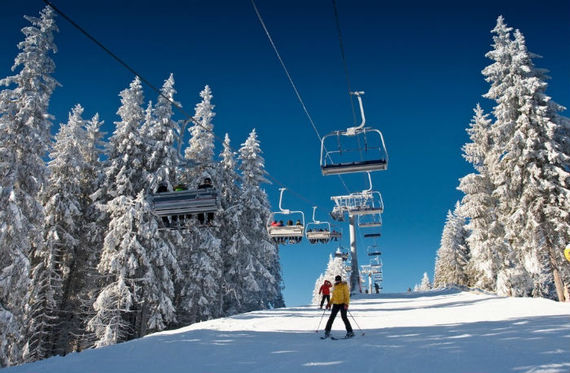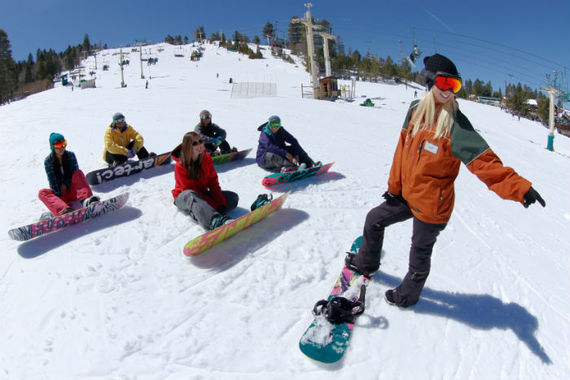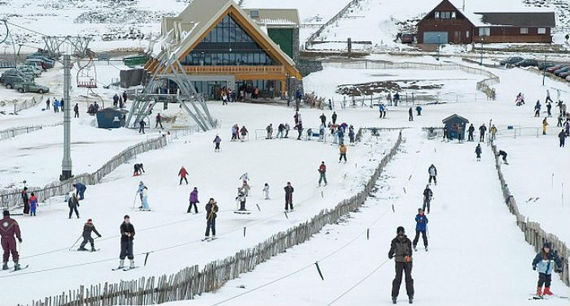As a Ski Patroller, I love seeing more people coming out to enjoy the slopes as "first timers" and beginner skiers/riders. The following points are really not as much tips as they are the basics:
1. First Time Ever? Pick skiing or snowboarding
Let me start right at the beginning. If you are a first timer (or "never ever"), you've made a decision about winter. You've decided against "hibernating" and "hating winter" (assuming you live in a cold, winter climate) and decided that you actually want to get out and "enjoy winter."
Enjoying winter at a ski resort means you have a choice -- skiing or snowboarding. I've been a skier since the age of 6 and I've never snowboarded. But the choice is yours (not mine). One thing is for sure...don't buy skis or a snowboard before you've tried one and/or the other. Rent first and see what feels right for you. Most people choose one or the other and naturally get better as they get out more.
2. Dress for Winter!
As a Ski Patroller, I see "newbies" every time I'm at the hill. I see folks with nothing on their heads (a helmet is highly recommended); no gloves; jeans (when you fall, you will eventually get wet and cold); long coats (not jackets), etc.
It really is simple -- you need to dress for the winter weather and the sport. (Need some help? Here are some tips to stay warm on the slopes). Layer up and cover up with long wicking underwear, sweater, ski jacket, ski gloves/mitts, helmet, goggles and face protection. With proper clothing, you can stay out and enjoy the winter's day.
3. Take a Lesson!
I'm mystified by first timers who think that they can just come out and strap on skis or a board and actually know how to ski or board. It's helpful to take a lesson, from a professional ski instructor, in order to work through the basics and improve your skills. Of course, after you take your lesson, you can practice what you've just been taught.
Be patient and be ready to learn new skills. Stay balanced; bend your knees, etc.
4. Stay on the Beginner Slopes!
Stay on the green runs (beginner runs) and don't go on the blue runs (intermediate) or black diamonds (expert runs) until you're ready. The #1 rule on the "Alpine Responsibility Code" is "always stay in control."
As a beginner, it's almost impossible to stay in control on an expert run. You'll either be stopped part way down the run (in the way of other skiers, and trying to figure out how to get down); possibly fallen; or screaming down the hill at high speed because you can't control your speed. In any case, you're not in control. Pick the slope that is right for you at your current skill level. Like anything, you'll get better with practice and you'll eventually get down that expert run -- but do it when you are really ready, not today.
Here are more tips on riding & skiing etiquette.
5. Pace Yourself!
There are two points here. As mentioned immediately above, you can't possibly transition from beginner to expert in a day (or a season even). Pace yourself and be patient. Take lessons, learn and practice. You can become an expert level skier or boarder over time.
The second point is "ski conditioning." I ski all day as a Ski Patroller and I don't expect family or friends to ski all day with me unless they are die-hard skiers too. As a "first timer" or "beginner," you need to pace yourself for your time on the slopes. Take breaks for warmth, nutrition and rest. If you've never skied before, you will be exhausted at the end of the day (and usually the following day). When you feel you are tired, it's time to go rest or go home. Bad stuff happens when you are too tired.
There you have it. Have fun and enjoy your day at the slopes!
By Mark Crone / @Marktravel


